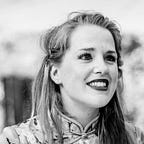Taking the ego out of philanthropy
One year ago, we made the decision to radically change the Vanderes Foundation its strategy, reasoning we could make a much bigger positive impact if we did things different. It wasn’t an easy decision, since we had to ask our portfolio partners (all amazing social entrepreneurs who are making a big difference by providing affordable student financing options for underprivileged students in lower-GDP countries) to stop recycling our capital and start collecting repayments. Although I’m still in contact with all of them, I do miss the more regular conversations. It’s amazing to hear the stories of individual students graduating and finding jobs and even better to hear that organisations like InvestEd and DANAdidik were able to get access to institutional lenders, because we took the initial risk to provide them with their first, cheap capital to prove their business models.
Now, if we were convinced that these amazing entrepreneurs were on the right path of making a difference for so many young students around the world, then why would we change direction? Because we realised we could actually do better (read here how we came about this insight). And that is why we stopped to provide cheap capital to social enterprises and started to invest our capital in the market. Last week I donated our returns (4x more than last year) to two highly effective charities.
The first one is TaRL Africa, which is the spin-off of a program called Teaching at the Right Level, which was developed by Pratham and MIT’s J-PAL. Last year’s donation went to Pratham as they were the most effective (backed by scientific research) charity within education we could find. The program focuses in India on lobbying at state level to put children together based on their academic capabilities instead of age, which improves the learning outcomes tremendously. TaRL Africa is the “great marriage of Pratham’s visionary approach and J-PAL’s commitment to improving outcomes and cost-effectiveness of policy by scaling evidence-based programs” as Alison Fahey of J-PAL so beautifully said. We are very happy to support that effort to scale-up the intervention.
The second charity we support this year is Iodine Global Network (IGN), which ‘supports and catalyses global and national iodine programs, working with key public, private, scientific and civic stakeholders.’ To be honest, I was not even aware children need iodine in order to develop their frontal cortex nor that an iodine deficiency could lead to a reduction of 10–15 IQ points. This issue was not on my radar at all.
IGN works with partners like UNICEF and USAID to provide iodine to iodine deficient populations. Their own work occurs on a higher level to accelerate the progress to eliminate iodine deficiency by doing research, lobbying at governments, etc. For both TaRL Africa as well as IGN counts that they are not the people with the gripping stories of happy children receiving their support. These organisations basically pave the road for others to implement these interventions in the best possible way.
It’s difficult to feel a ‘warm glow’ when giving to organisations that lobbies with local governments and carry out research. Especially when you compare it to a message received from a student named Shawn to let you know he graduated Cum Laude with help of our loan provided through one of our partners, Zomia.
But if you agree that the lives of all human beings are equal, then you have to think bigger picture. We feel that it’s our obligation to do the best we can. That means we support the most effective programs we can find and don’t mind what it is they are doing, as long as they create the most Quality Adjusted Life Years (QALYs) as possible. So, we make use of experts, people who dedicate their time to finding and evaluating the most effective charities around the world and follow their advice.
We don’t claim any credits for finding these two amazing charities and support their work. It’s important to remember how biased human beings are, how bad we are in understanding scale and how much time it costs and knowledge you need to find the best charities out there. By taking our ego’s out of the decision-making process and trusting experts like GiveWell, Founders Pledge and J-PAL we can do so much better.
